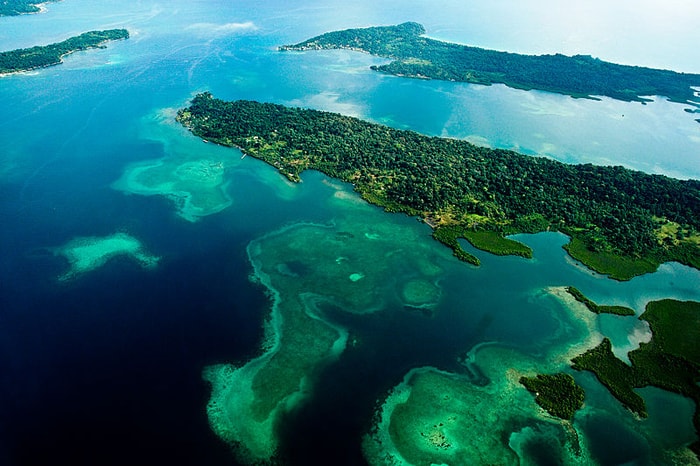FOR the first time, four marginalized Central American communities performed an intercultural theater play in Panama, in the Caribbean islands of Bocas del Toro and Bastimentos. Since the beginning of February, 40 indigenous actors, musicians and dancers from Central America practiced on the island of Bastimentos to combine their myths, rhythms, dances and cultures. They performed the resulting art fusion Feb. 25-26, thanks to a French theater organization and its intercultural project Corazón de la Tierra (The Heart of the World).
The islands, just a few hours south of Costa Rica, offered a perfect setting, with their turquoise water and white-sand beaches. Two plays were presented to local and international spectators, to raise consciousness about these marginalized cultures.
The project included two Indigenous tribes (the Maya of Lake Atitlán in Guatemala and the Kuna Indians of Ustupu, in the autonomous territory of Panama) and two black minority communities (the Garifuna of Triunfo de la Cruz in Honduras, and the Congo tribe of Panama). Corazón de la Tierra aims to create a Euro-Central American cultural network, focusing on these cultures and identities.
“The main theme of the play is to fall into a dream,” explained Anne Sylvie Mayza-Badré, the French artistic director of the company. “It is a theme that gathers the four communities, their mythologies, the visible and the invisible – the ancestors.
“Typically worldwide, dreams are important; however, in the Western world, we tend not to value them. For the Maya, Kuna, Garifuna and Congo, a dream is symbolic of reality. It is not ‘just a dream.’ The dream allows the actors to jump from one element to another, with different scenes in their histories and religions.”
THE theater project began in 1995, as an initiative of the French theater group Babel Tower. The idea, according to founders, is that everyone is different; however, languages are not a barrier.
The Babel Tower first worked with the Maya K’iches in Guatemala, creating a play on the Pop wuj, the only Maya book explaining the creation of the world. The show played in Guatemala and France. The organization then expanded the project to other countries in Central America, creating Corazón de la Tierra.
“Central America is a mosaic of cultures, peoples and tribes who do not always get along and are especially unfamiliar with each other,” explains Mathieu Goudin-Ebbesen, a volunteer with the organization. “It is very interesting to have them all work together while maintaining the cultural integrity of each group.”
THE four communities are very different from one another and yet complement each other. They are all minorities suffering from exclusion. “What unites them is the presence of magic, the spells, and the cult of the ancestors,” says Mayza-Badré. “The names and the stories change, but they have many similar ways of thinking.”
The Maya from Lake Atitlán are quite introverted in their art. They are very religious, often intellectualizing their acting. This small group suffered terrible trauma during the Guatemalan civil war, since many family members have ‘disappeared’ or have been tortured. The six men of the group give all their energy in the play, where they have the opportunity to present their spiritual leader, the Machimon.
In contrast, the Garifuna are not afraid to use their voices and bodies to express themselves, with their art based on improvisation and spontaneity. They dance with African-influenced rhythm, creating an amazing ambiance with their drums and voices. They are the descendants of African slaves mixed with the Arawak native indigenous to the island of San Vicente.
The Garifuna have spread all over the Caribbean coast of Central America and gained a distinct culture apart from the Latinos. In today’s context of globalization, this Honduran minority fears the loss of their cultural heritage. Theater is a way to remind the world of their existence.
THE Kuna Indians from Ustupu, in the Kuna Yala archipelago of Panama, can be seen as a warrior tribe. They are one of the few indigenous people who fought against the army of Panama to protect their traditions and culture, and who managed to find external help to remain an autonomous territory.
They have maintained their traditional costumes and ways of living. Their art is very organized and structured. Also from Panama, the black community of the Congos is the newest arrival in the project. They brought their Queen for this unique theater performance. Locals often recognize this famous old woman, carrying her huge crown proudly, from TV.
She explained the meaning of the Congos’ traditional dances, usually performed during the annual carnival. The princess and the prince of the Congos also participated in the play.






